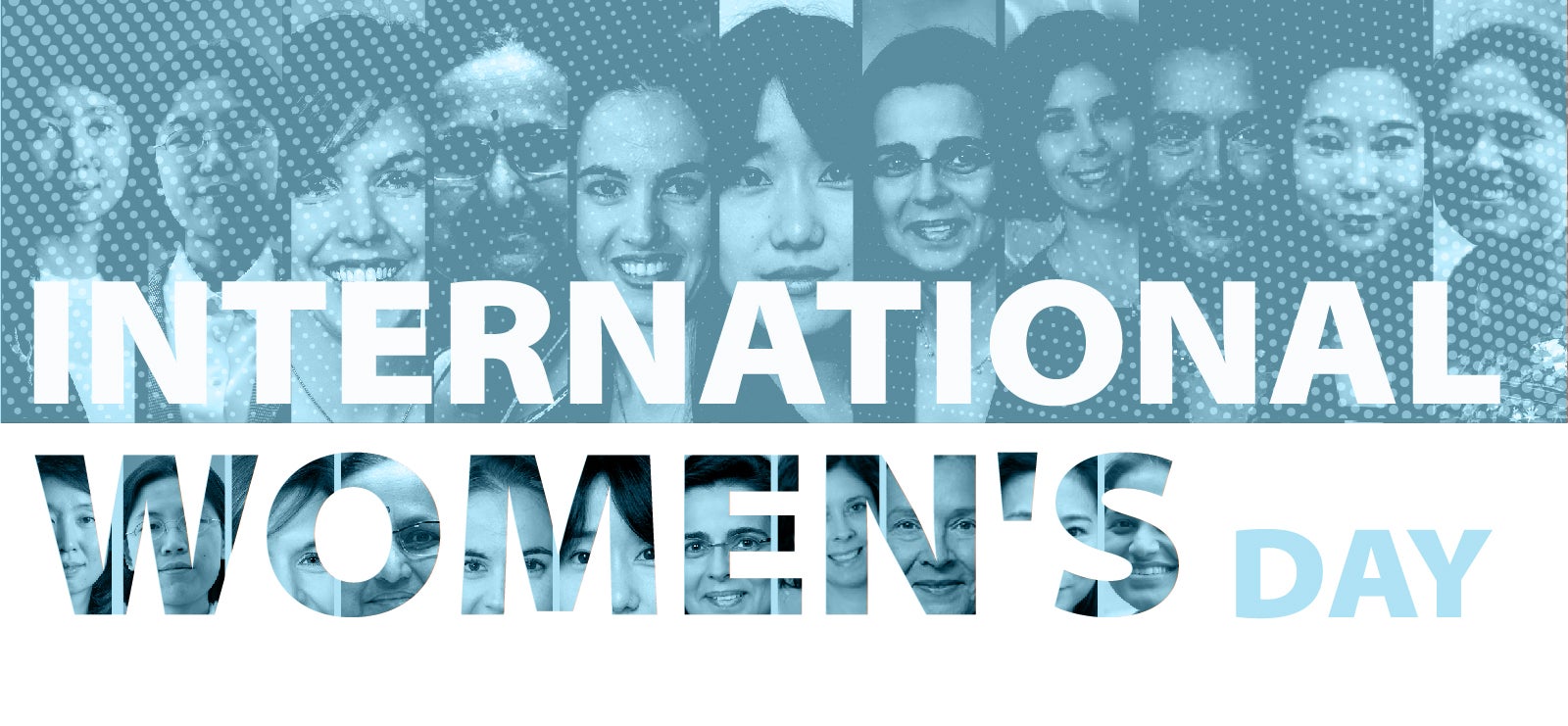The Department of Electrical and Computer Engineering (ECE) at Rice celebrates International Women's Day by highlighting the female faculty members who inspire colleagues and students with their dedication to research.
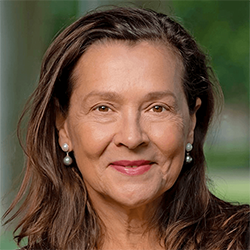 Naomi J. Halas, Stanley C. Moore Professor, professor of ECE, of biomedical engineering, of chemistry, of physics and astronomy, and director of the Smalley-Curl Institute and of the Laboratory for Nanophotonics:
Naomi J. Halas, Stanley C. Moore Professor, professor of ECE, of biomedical engineering, of chemistry, of physics and astronomy, and director of the Smalley-Curl Institute and of the Laboratory for Nanophotonics:
Halas earned her Ph.D. in physics from Bryn Mawr College and joined the Rice faculty in 1990. She is known for showing that the nanoscale internal and external morphology of noble metal nanoparticles controls their optical properties. She was the first person to introduce structural control into the colloidal synthesis of coinage metal nanoparticles to control their optical resonances. Her work helped merge chemical nanofabrication with optics, giving rise to the field of plasmonics. She pursues fundamental studies of coupled plasmonic systems as well as applications of plasmonics in biomedicine, optoelectronics, chemical sensing, photocatalysis and solar water treatment. Her research focuses on optics and hotonics, design and fabrication of optically responsive nanostructures, nanophotonics and plasmonics.
Halas Research Group | Smalley-Curl Institute
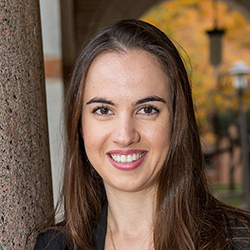 Genevera Allen, associate professor of ECE, of statistics, of computer science (CS), and investigator at the Jan and Dan Duncan Neurological Research Institute at Texas Children’s Hospital and Baylor College of Medicine.
Genevera Allen, associate professor of ECE, of statistics, of computer science (CS), and investigator at the Jan and Dan Duncan Neurological Research Institute at Texas Children’s Hospital and Baylor College of Medicine.
Allen earned her Ph.D. in statistics from Stanford University in 2010. She joined the Rice Faculty in 2010 and founded the Rice D2K Lab, a campus hub for experiential learning and data science education, in 2018. Allen’s research focuses on developing statistical machine learning tools to help people make reproducible data-driven discoveries. Her work lies in the areas of interpretable machine learning, data integration, modern multivariate analysis, and graphical models with applications in neuroscience and bioinformatics.
D2K Lab | Statistical Machine Learning Group
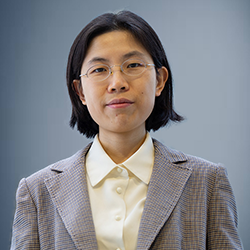 Shengxi Huang, assistant professor of ECE:
Shengxi Huang, assistant professor of ECE:
Shengxi earned her Ph.D. in electrical engineering and computer science from MIT in 2017, joined the Rice faculty in 2022 and leads the SCOPE (Sensing, Characterization, and OPtoElectronics) Lab. Her research interests include light-matter interactions of quantum materials and nanostructures, and development of new quantum optical platforms and biochemical sensing technologies. In particular, her research focuses on understanding optical and electronic properties of new materials, developing new biochemical sensing techniques with applications in medical diagnosis and exploring new quantum optical effects and quantum sensing.
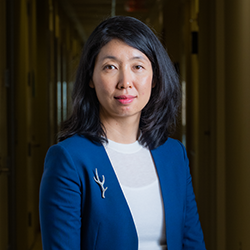 Lan Luan, assistant professor of ECE:
Lan Luan, assistant professor of ECE:
Luan earned her Ph.D. in physics from Stanford in 2011. In 2014 she made the transition from physics to biomedical engineering, and joined the Rice faculty in 2019 as a member of the Neuroengineering Initiative. Luan’s research focuses on development of multimodal neural interfaces that combine state-of-art electrical, optical and other technologies to monitor and manipulate brain activity. The application of these advancements enables the fundamental investigation of neurological disorders and development of novel therapies. By developing and applying a more complete arsenal of tools, she hopes to provide a multifaceted picture of the brain in health and disease, and to seek new ways to better diagnose, treat, cure and even prevent brain disorders.
Integrative Neural Interface Lab
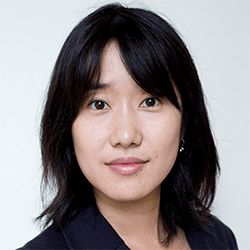 Akane Sano, assistant professor of ECE:
Akane Sano, assistant professor of ECE:
Sano earned her Ph.D. from MIT, joined the Rice faculty in 2018 and directs the Computational Wellbeing Group. Before coming to Rice, she served as a research scientist in the Affective Computing Group at MIT Media Lab, and as visiting scientist and lecturer at People-Aware Computing Lab at Cornell. She works development of human-centered computing technologies for health, wellbeing and performance. She developing tools, algorithms and systems to measure, forecast, understand and improve health and wellbeing. She uses multimodal data from mobile and wearable sensors, devices in daily life settings and clinical assessment, especially for measuring, predicting intervening and improving clinical outcomes, stress, mental health, sleep and performance.
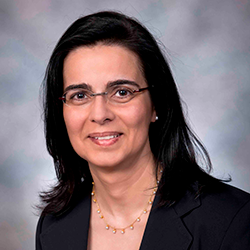 Lydia E. Kavraki, Noah Harding professor of CS, professor of Bioengineering, of ECE and of mechanical engineering (MECH), and director of the Ken Kennedy Institute:
Lydia E. Kavraki, Noah Harding professor of CS, professor of Bioengineering, of ECE and of mechanical engineering (MECH), and director of the Ken Kennedy Institute:
Kavraki earned her Ph.D. in computer science from Stanford and joined the Rice faculty in 1997. Her research interests span robotics, AI and biomedicine. In robotics and AI, she is interested in enabling robots to work with people. Her research develops the underlying methodologies for achieving this goal: algorithms for motion planning for high-dimensional systems with kinematic and dynamic constraints, integrated frameworks for reasoning under sensing and control uncertainty, novel methods for learning and for using experiences, and ways to instruct robots at a high level and collaborate with them. Kavraki’s lab works on a variety of applications: from robots to assist people in their homes, to robots that build space habitats. In biomedicine she develops computational methods and tools to model protein structure and function, understand biomolecular interactions, aid the process of medicinal drug discovery, analyze the molecular machinery of the cell and help integrate biological and biomedical data for improving human health.
Kavraki Lab | Ken Kennedy Institute
 Christy Landes, Kenneth S. Pitzer-Schlumberger Chair and Professor of Chemistry, of ECE and of chemical and biomolecular engineering, and director of the Center for Adapting Flaws into Features:
Christy Landes, Kenneth S. Pitzer-Schlumberger Chair and Professor of Chemistry, of ECE and of chemical and biomolecular engineering, and director of the Center for Adapting Flaws into Features:
Landes earned her Ph.D. from the Georgia Institute of Technology in 2003 and joined the Rice faculty in 2014. Her research focuses on spectroscopy and imaging, and aims to understand the frequently complex structure-function relationships in biological processes and use this information to inspire innovation for materials design. Her group works on development of experimental data acquisition and analysis methods to optimize information retrieval in single-molecule and single-particle spectroscopies; characterizing biological examples of heterogeneous structure-function relationships; identifying, understanding and optimizing heterogeneous structure-function relationships in synthetic systems.
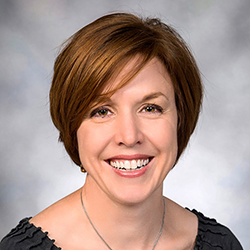 Marcia O'Malley, Thomas Michael Panos Family Professor in MECH, of CS, and of ECE, and associate dean for research and innovation in the George R. Brown School of Engineering:
Marcia O'Malley, Thomas Michael Panos Family Professor in MECH, of CS, and of ECE, and associate dean for research and innovation in the George R. Brown School of Engineering:
O'Malley earned her Ph.D. in MECH from Vanderbilt University in 2001 and joined the Rice faculty that year. Her research addresses issues that arise when humans physically interact with robotic systems and focuses on the design of robotic hardware and control systems for applications that involve collaboration between humans and robots. Examples include skill training in virtual reality; control of remote robots; human-human, human-robot, and human-agent communication; and movement assistance for workforce safety, dexterity enhancement, strength enhancement and rehabilitation following injury.
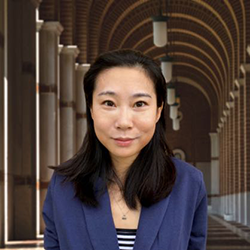 Su Chen, assistant teaching professor, Rice D2K Lab:
Su Chen, assistant teaching professor, Rice D2K Lab:
Chen earned her Ph.D. in statistics and data science from the University of Texas at Austin. She is an associate of the Society of Actuaries (ASA) and has experience working in an actuarial consulting firm. She has developed and taught both lower- and upper-division undergraduate courses in math, statistics and data science at UT-Austin and Texas A&M University. She joined the D2K Lab in 2020. Her research lies in the interaction of methodology, theory and computation of Bayesian statistics and their applications to high-dimensional data analysis.
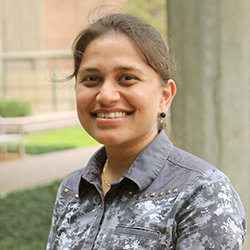 Pratiksha Dongare, assistant research professor of ECE:
Pratiksha Dongare, assistant research professor of ECE:
Dongare earned her Ph.D. in in applied physics from Rice University in 2020 and joined the Rice Faculty in 2022. Over the past several years, she and her team at Rice have developed a system that effectively removes salt and other minerals from brackish water using solar energy and nanophotonics (harnessing light on the scale of nanometers) to supply thirsty places with potable water. It works by using membranes coated with inexpensive, sunlight-absorbing nanoparticles that transform the filter into a super-efficient heat source.The process increases the output of purified water by 50 percent without using fossil fuels. Unlike traditional de-sal plants that rely on conventional electricity and the infrastructure that supplies it, Dongare’s device is also potentially useful in remote areas, on a domestic and community scale.
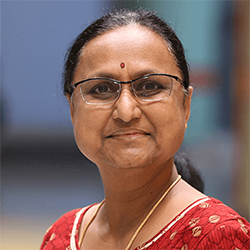 Devika Subramanian, professor of CS and of ECE:
Devika Subramanian, professor of CS and of ECE:
Subramanian earned her Ph.D. in CS from Stanford in 1989 and joined the Rice faculty in 1995. Her research interests are in artificial intelligence and machine learning, and their applications in computational systems biology, neuroscience of human learning, assessments of hurricane risks, network analysis of power grids, mortality prediction in cardiology, conflict forecasting and analysis of terrorist networks, and analysis of unstructured text data.

